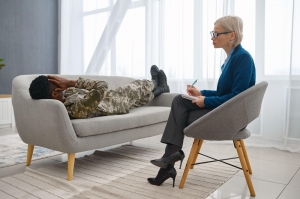Introduction:
Veterans often carry the invisible scars of war long after they return home. While their bravery and sacrifice are commendable, the mental and emotional toll of combat experiences can be profound. Fortunately, therapy offers a lifeline for veterans struggling with the aftermath of their service. In this blog, we'll explore the crucial role therapy plays in supporting veterans' mental health and well-being.
1. Understanding the Challenges:
Transitioning from military to civilian life can be overwhelming for many veterans. The abrupt shift from the structured environment of the military to the unpredictability of civilian life can trigger feelings of isolation, anxiety, and depression. Additionally, veterans may grapple with post-traumatic stress disorder (PTSD), traumatic brain injuries (TBI), substance abuse, and other mental health issues stemming from their service.
2. Access to Specialized Care:
One of the key benefits of therapy for veterans is access to specialized care tailored to their unique experiences and needs. Many therapists and counselors have specific training in military culture and trauma-informed care, allowing them to provide targeted interventions that resonate with veterans. Whether it's cognitive-behavioral therapy (CBT) for managing PTSD symptoms or support groups for combat veterans, these specialized services can make a significant difference in veterans' recovery journeys.
3. Building Coping Skills:
Therapy equips veterans with valuable coping skills to navigate the challenges they face in civilian life. Through counseling sessions, veterans learn healthy ways to cope with stress, regulate their emotions, and communicate effectively with loved ones. By acquiring these skills, veterans can enhance their resilience and adaptability, empowering them to thrive in the face of adversity.
4. Fostering Connection and Camaraderie:
Many veterans struggle with feelings of alienation and disconnection from society. Therapy provides a safe and supportive space where veterans can connect with others who share similar experiences. Whether it's group therapy sessions or peer support networks, these opportunities for camaraderie foster a sense of belonging and understanding that is often lacking in civilian life. By building meaningful connections with fellow veterans, individuals can find solace in knowing they are not alone on their healing journey.
5. Promoting Holistic Well-being:
Therapy for veterans extends beyond addressing mental health issues; it encompasses holistic well-being encompassing physical, emotional, and social aspects. Therapists may incorporate various modalities such as art therapy, mindfulness practices, and recreational activities to promote overall wellness. By taking a comprehensive approach to treatment, therapy helps veterans reclaim their sense of purpose, rediscover joy in life, and cultivate a renewed sense of self-worth.
Conclusion:
In conclusion, therapy plays a pivotal role in supporting the mental health and well-being of veterans. By addressing the unique challenges they face and providing specialized care, therapy empowers veterans to heal from the invisible wounds of war and reclaim their lives. Through building coping skills, fostering connection, and promoting holistic well-being, therapy offers hope and healing to those who have served their country with honor and courage. It's essential to continue advocating for increased access to therapy services for veterans, ensuring that they receive the support and care they deserve.





